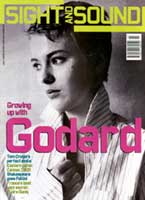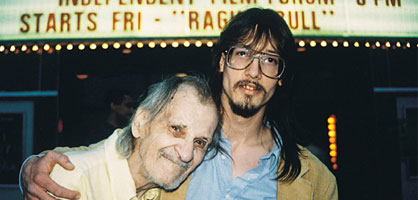
Dream On
Film of the Month: American Movie The Making of Northwestern

American Movie wants us to respect an aspiring film-maker's struggle to get his debut made but the more likely response is laughter, argues Charles Taylor.
When the history of American independent cinema in the 90s is written, one of the major influences cited may well be the freak show. Indie film-makers' fondness for presenting their characters as grotesques and fools is perhaps best represented in the work of Todd Solondz (Happiness). But it's not only fiction films which encourage audiences to feel superior to the poor schmucks on the screen. Documentary film-maker Michael Moore (whose 1989 film Roger & Me was a surprise mainstream hit) has garnered a reputation as an anti-corporate voice for the little guy while getting his funding from the likes of Disney - and, more significantly, ridiculing the very people (notably low-paid security guards who have to put up with his on-camera pranks) whose side he's supposed to be taking.
What makes Chris Smith's documentary American Movie The Making of Northwestern so hard to evaluate is that while the effect of the film is similar to indie cinema's appetite for ridicule, its intent is not. Smith met his film's subject Mark Borchardt - an impecunious film-maker in his thirties - at the University of Wisconsin where Borchardt was making his 35-minute horror short Coven and Smith was doing post-production work on his previous film American Job. Using leftover stock from that film, Smith and his producer/sound recordist Sarah Price spent the next two years documenting Borchardt's attempts to finish Coven and finance a feature, Northwestern.
There is a creditable lack of irony in the way Smith treats the people who come before his camera. Unlike Moore, he doesn't turn them into visual caricatures. The direct-to-camera interviews are shot simply, without trapping the subject in the frame. And when the participants are seen going about their lives, Smith observes unobtrusively (Borchardt has been making movies with his family and friends since he was 14 and the people in his life seem to be used to cameras).
At one point Smith asks Borchardt's three kids what was the last film their dad took them to see. "Apocalypse Now," pipes up Borchardt's little son, who can't be more than eight. It's an odd moment because the boy seems completely unfazed by the experience of watching Francis Coppola's violent 1979 Vietnam epic - he even giggles as he mimics Brando's famous line, "The horror, the horror." The reference to Apocalypse Now also brings to mind Hearts of Darkness: A Filmmaker's Apocalypse, George Hickenlooper and Fax Bahr's brilliant documentary of the catastrophic making of Coppola's film. Just as Hickenlooper and Bahr focus on Coppola's drive to make his Vietnam movie in the face of mounting difficulties - which send him to the edges of sanity - so Smith is fascinated with Borchardt's singular obsession to finish his film. The difference, however, is that Hearts of Darkness is about the madness only very talented people are capable of. (When you see Coppola announce, "My movie isn't about Vietnam. It is Vietnam," alarm bells start going off in your head.) Mark Borchardt may be kidding himself about what he can do - despite being started in the early 90s, Northwestern remains unfinished - but it's an altogether more ordinary brand of delusion.
Clearly Smith sees American Movie as the story of a man pursuing his dream. As evidence of Borchardt's dedication, Smith shows the unsuccessful film-maker working in a series of menial jobs - delivering papers between 2am and 7am, grounds-keeping in a local graveyard - to pay for his productions, getting deeper into debt but refusing to give up. But it's not enough for a subject to have a passion if we can't get swept up in it, and Borchardt - as he appears in Smith's film - simply isn't an interesting enough figure to occupy the centre of a movie.
Tall and gangly with long, stringy hair and oversized glasses, Borchardt is neither charismatic nor particularly bright. Given to homilies and bromides ("No one has ever paid admission to see an excuse," he tells someone working on the pre-production for his feature), Borchardt feels he has frittered away much of his life and sees getting Northwestern made as a do-or-die proposition. And yet for all his palpable enthusiam, he's prone to drunken bouts of bitterness. In one scene, after spending a Sunday watching the Super Bowl on television, he goes off on a profane rant about his contempt for people who work 40 hours a week and never pursue their dreams. Surely some part of Borchardt must be aware of - and resent - the doubts his family has that he'll ever succeed. Even his elderly uncle Bill, who's invested heavily in Coven, seems to regard the likelihood of a return on his money as distant. Similarly, in an interview, one of his brothers says Mark may only be suited for factory work.
That's a terrible thing to say, particularly about your brother. But the sad part of American Movie is that it may be true. Borchardt is a high-school dropout with no skills and no interests other than film-making. The reality behind what's presented as Borchardt's dedication is that, in his thirties, he's still living with his mother and owing thousands of dollars in child support. It's hard to be sympathetic towards Borchardt's dedication when you see him straggle into his daughter's birthday party and give her only a card.
Smith may want to insist that the point is not Borchardt's chosen profession but his passion. ("Mark could have been into demolition derbies," he has said of his subject. "It didn't matter.") But what makes American Movie such depressing viewing is that it takes as its subject someone with a passion for an avocation at which he will clearly never succeed. From what we see of Borchardt's productions, his grasp of dialogue and directing actors has not developed since his initial teenage efforts (short home-movie gore-fests shot on Super 8 sporting such bizarre titles as The More the Scarier and I Blow Up). There's an amateurish stiffness to his work which it's hard to imagine any audience accepting. Chris Smith is clearly not responsible for whatever happens to Mark Borchardt. But the question has to be asked: how can the attention Borchardt receives from American Movie, the knowledge that a professional film-maker has taken him seriously as a film-maker, help but encourage him?
And though Smith is not responsible for the insensitivity of audiences, he must be aware that American indie film has so long pushed a vision of the middle and working classes as rubes and naïfs that laughter is the likely reaction to his subjects. (Many of the American reviews described the film as a comedy.) Certainly Smith had to know that Borchardt's friend Mike Schank, a squat, heavy man with a wafting, disassociated manner who lives off his lottery-ticket winnings, would provoke laughs. When Schank reveals a nearly fatal drug episode in his past that seems a likely explanation for his spaciness, it's queasy-making, as if you'd been made to laugh at someone you haven't been told is damaged.
Indie cinema isn't fully represented by the strain to which American Movie, despite its good intentions, attaches itself. It is still capable of astonishments - Michael Almereyda's exquisite new version of Hamlet, for instance - that would have no home in the mainstream. And one-time indie darlings such as David O. Russell (Three Kings) and Steven Soderbergh (Erin Brockovich) are now providing Hollywood with mainstream films that stand comparison with some of the best work from the glory days of the early 70s. But US independent cinema has aligned itself often enough with sarcasm, empty irony and cruel ridicule to be answerable. In this context, Smith seems as cut off as his subject, offering up Mark Borchardt in an atmosphere in which he seems fated to become the fashionable oddity of the moment.
